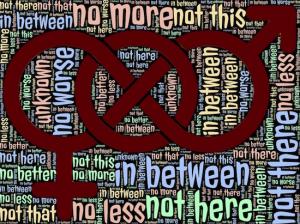Content Warning: this post includes references throughout
to transphobic rhetoric, self-harm, and eating disorders.
Go here to read the background to, and first part of, the rant below.
Authority Is By Nature Indecent
As I said in my last, the overwhelming majority of Catholics have no skin in the game in discussing trans issues. Now, in principle, this ought to be a huge restraint in how they talk about these issues, and indeed on the extent to which they talk about them at all. However much social media encourages us to run our mouths, there is still such a thing as courtesy. Lecturing others about any subject, when your lectures cost you nothing and may cost them all earthly peace of mind and hope of contentment, is a pretty outrageous piece of callous insolence. It’s not unlike asking someone on a date, telling them to pay for it, and then ordering the most expensive thing on the menu—except covering an entire life, instead of a single lousy evening.

That said, there is a partial concession to make to Catholic priests here (though still not to self-appointed transphobic busybodies who happen to be Catholic). Who gets what experiences is a bit of a crapshoot; sometimes the Church needs guidance on a given moral issue, but few to no people in the Church have both the firsthand experience and the theological expertise called for to provide it. I think part of the reason God instituted clergy is so we’d have people bearing the duty to define, teach, and explain Catholic doctrine, irrespective of their worthiness.
The alternative, as far as I can tell, would be to only have self-appointed teachers. You probably don’t need me (a self-appointed teacher if ever there was one) to tell you why that would be insufferable.
However. Having an office of this kind does not, in any way, excuse priests from doing their level best to know what they’re talking about before they open their mouths. Infallibility is not the personal gift of each man with any degree of Holy Orders; and even if it were, infallibility doesn’t mean omniscience. And while a priest can say “I don’t know”—and should when it’s true—”knowing what to say about trans stuff” is part of his job description, insofar as it’s a moral question relevant to the lives of his parishioners or their loved ones at the very least.

The eighteenth-century controversy over interest versus usury was actually a good example of this working the right way (or so I gather). Usury was familiar to, and condemned by, the Church; when our modern economic system began to take shape, many people argued either that the kind of interest it relies on isn’t usury, or that usury is fine. The Church took time to examine the question—ensuring she knew what she was talking about—and ultimately decided in favor of the first claim.1
This leads me into the salient problems with the way Catholics, particularly the hierarchy, talk about trans issues.
1. None of them show even a basic level of engagement
with what trans people say about themselves.
When you’re talking about an issue that affects other people and not you, there is one basic, obvious gesture of good faith: go ask those other people about it. As far as I can tell, few to none of the priests and bishops who prattle on about trans issues have bothered to talk to any trans people about this stuff. They regularly show ignorance of the simplest, most elementary concepts and distinctions in trans discourse in the very act of “explaining” it.
Ignorance isn’t always offensive, of course. We all start out ignorant of things we haven’t looked into. But we’re responsible to recognize and admit that we’re ignorant—not because it’s sensitive or generous of us to do so; it’s just truthful.

In pastors, ignorance about gender identity is at best a weakness, especially here and now. For an ignorant pastor to pontificate about the spiritual or psychological or, worst of all, medical realities of gender identity, without doing adequate—or any—research into the question, is vile. On the moral side, casually presenting your guesses about medicine as due cause to desist from prescribed medications2 is toying with people’s lives. No one (pace Fr. Nix) has a right to behave that arrogantly. To bring in the intellectual dimension …
Excursus on the Eighth Commandment3
If you’re going to talk about what someone else thinks, for any reason, you have a duty to find out what they think, not make it up from your own head. Doing otherwise is called “lying.”
To be clear: this includes making what seem to you like reasonable guesses about what a person or group’s views probably are, and then claiming that those are their views, without bothering to verify your assumptions. At the hypothesis stage, before you’ve begun to research, it’s natural to make some advance guesses. The problem comes when those guesses are advanced as if they were fact, instead of duly represented for what they are.
Either American Catholic bishops and priests have not thought this through, or they are choosing with increasing deliberateness to ignore the dishonesty involved. In either case, culpably or not, they bear false witness against the trans community constantly.

I find it extremely easy—infuriating, yes; repulsive, yes; but easy—to believe that our bishops and priests are exactly lazy and callous enough to casually lie about this. Look at the abuse crisis. That woke the wrath of the whole country (for a minute), Catholics included, and our immediate result was empty apologies, empty promises, and a new policy on abuse drafted by one of the perpetrators—drafted, what’s more, in a manner that exempted his own office, that of bishops, from scrutiny. And what substantial repentance has any member of the hierarchy done since? And by “substantial,” I mean the kind that issues in actions, especially those kinds of actions called reforms; and by “reforms,” I mean the kind that could curb the blatant lies, unaccountable financial and administrative power, and aura of prestige by means of which the hierarchy, you know, did an abuse crisis. So no, I do not believe that our priests and bishops are above flat-out making things up about a very small and relatively politically powerless group who also happen to be popular scapegoats for child sexual abuse.4
2. Hand in hand with the last point: they consistently project
ideas and motives onto trans people that are false to the facts,
irrelevant, slanderous, and sometimes even manifest nonsense.
Plenty of Catholic authorities warn the faithful about the dangers of “gender ideology.” I have yet to find one (1) Catholic authority that has given a coherent statement of what this ideology consists in, or at any rate a coherent statement I could successfully track down. (And the phrase itself isn’t exactly transparent. Does it just imply the idea that there … is gender? In the world?)

I think the closest thing I ever saw to a definition of “gender ideology” was that it is the belief that gender isn’t real, and is totally up to our personal autonomy, and is a form of oppression. I can’t help feeling that this is probably not a faithful representation of any sources that the warning parties might pretend to be drawing on.
Incidentally, “gender ideology” also isn’t something I have ever seen any human claim to subscribe to. This does not of itself make the term meaningless or invalid; sometimes we group ideas in ways that their adherents rarely or never do.5 But in my experience, an exonym like this—that is, a name for a group coined and mainly used by people outside of that group—is a consistent indicator that the people using it have (at best) a seriously limited grasp of the group they’re talking about, and the vaguer and more frequently-used the exonym, the worse a grasp it tends to imply. (How many Protestants have you met who frequently and unironically call Catholics “Romanists” or the like, but who also have a reasonably clear notion of what Catholicism teaches or consists in?)
Sometimes “gender ideology” morphs into the accusation that trans people are implicitly Gnostic, and think the body does not matter. This proves only how intellectually lazy and dishonest the accusers are being. The obvious inference to draw from trans experience is that they do think the body matters; they’d hardly want to change it if they didn’t! A Gnostic seeks liberation from the body, as such, not liberation in a changed body. It is the latter which more closely aligns with how trans people talk—and also, you may notice, with the language of St Paul in II Corinthians.

Footnotes
1Technically there was no decision about the claim that usury is morally fine; it was never under serious consideration, as far as I know.
2I have here in mind such materials as puberty blockers and hormones, which are often prescribed to trans people. The latter are a standard element in transition. The former are sometimes prescribed during puberty, to stave off any irreversible-and-gendered developments and give trans-identifying teens time to, for lack of a better word, discern before (a) reaching the age of majority and (b) doing anything else irreversible-and-gendered.
3As everyone knows, this is the commandment forbidding the bearing of false witness.
4Yes, “relatively politically powerless.” Over the last several years, the trans community has achieved new visibility; this is not the same thing as power, as the many (often successful) state bills to restrict their rights suggest.
As to their being popular scapegoats for child sexual abuse: as far as I can tell, this is based literally on nothing. I am far from maintaining that a trans person could not also be an abuser of whatever kind, but still, I’ve only actually heard of three trans predators of any kind, and one of them is Buffalo Bill. (Jessica Yaniv is the second, and seems to be of unsound mind; the name of the third escapes me.) By contrast, if we actually want to play the Anecdotal Numbers Game, I could not possibly number the priests and pastors in this country—many of them married men with children of their own—who have been exposed as sexual predators, whether of children or adults.
5The category of Abrahamic religions is a good example here. It’s a useful term for talking about what really is shared in the histories and doctrines of Judaism, Christianity, and Islam (plus a handful of related faiths like Bahá’í). Still, I very much doubt that most Jews, Christians, or Muslims ever evaluate ideas or make decisions based on the thought “I am a member of an Abrahamic religion”!













